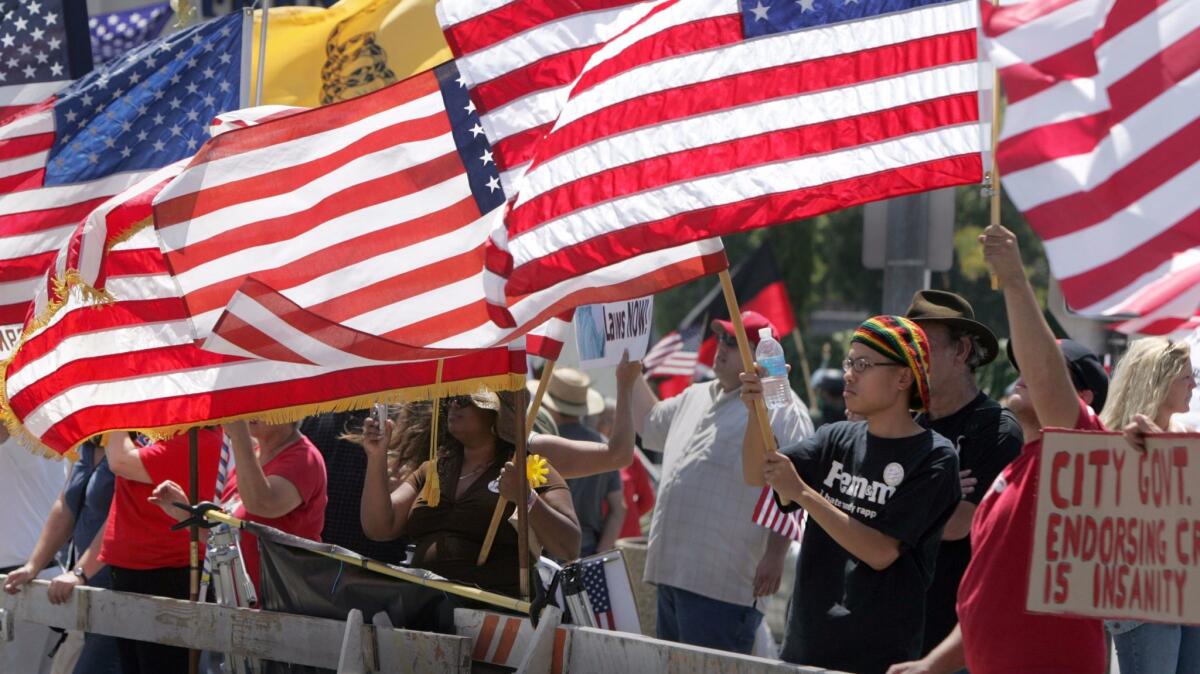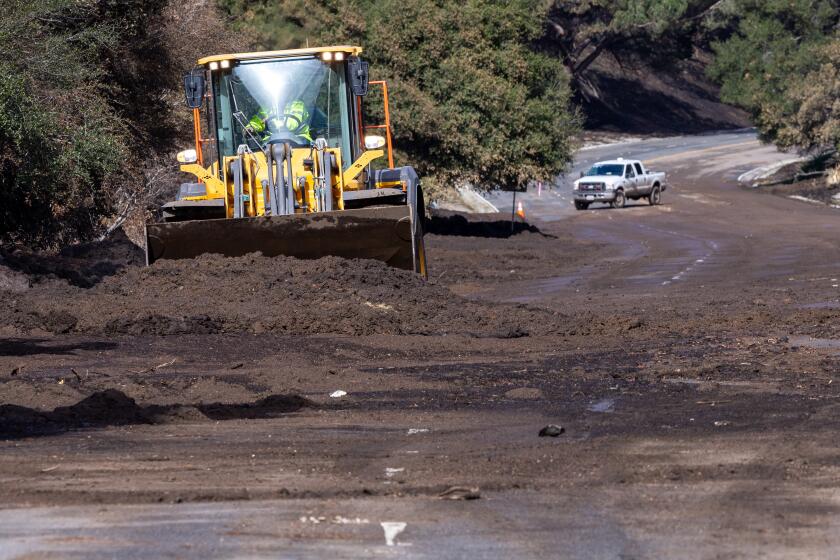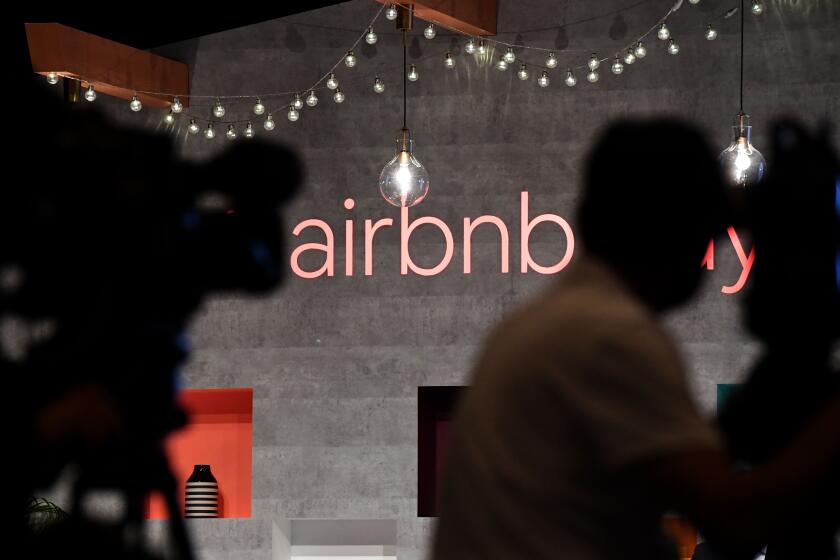Sanctuary city leaders vow to remain firm, despite threats from U.S. attorney general

California leaders say they will continue to protect people in the country illegally despite an announcement by U.S. Atty. Gen. Jeff Sessions that the U.S. Department of Justice would soon cut federal grants from so-called sanctuary cities.
- Share via
Leaders from so-called sanctuary cities across Southern California struck a defiant tone Monday, stating that they would continue to protect people who are in the country illegally despite threats by U.S. Atty. Gen. Jeff Sessions to cut off and even claw back grant funding from the Justice Department.
“We will fight this vigorously and still continue to maintain services to provide for our high quality of life in Santa Ana,” Sal Tinajero, a city councilman in Santa Ana, which voted unanimously to become a sanctuary city shortly after Donald Trump was elected president.
During a brief appearance at the White House briefing room, Sessions repeated previous statements that the Trump administration would seek to deny sanctuary cities some Department of Justice grant funds, but offered no new policies.
Still, officials in sanctuary cities scrambled to touch base with attorneys and explore their legal options.
“We are going to look into every single legal action that we can take to protect ourselves from the Department of Justice’s plan,” Tinajero said.
He said city leaders had already prepared for possible funding cuts, adding that Santa Ana has more than $50 million in reserve, just in case.
Maywood Councilman Eduardo De La Riva said the issue will likely be settled by the courts.
“I am confident that when this latest move is challenged in the courts, this too will prove to be yet another loss for this administration,” De La Riva said.
Maywood declared itself a sanctuary 11 years ago, enacting a law that said local police could not enforce federal immigration law.

Monday evening, Pasadena city officials are expected to take up a resolution on whether to declare itself a sanctuary for people who are in the country without legal status.
For most cities, the move is largely a message of political support for immigrants in the country illegally. But some cities have specific policies tied to them, notably San Francisco, which has come under criticism from Trump and during Session’s briefing on Monday.
Sessions cited a high-profile case in San Francisco where a 32-year-old woman was killed by man who had been previously deported multiple times despite a request by immigration authorities to continue his detention.
“Countless Americans would be alive today and countless loved ones would not be grieving today if these policies of sanctuary cities were ended,” Sessions said.
San Francisco Mayor Ed Lee could not be reached for comment, but he sent a tweet soon after Sessions’ announcement.
“#SF knows that #SanctuaryCities are safer, more productive, healthier places to live. We work for all our residents. #SFStandsAsOne,” he stated.
In a statement, a spokesperson for Lee said:
“San Francisco’s sanctuary city laws are in compliance with this federal law. If the federal government believes there is a need to detain a serious criminal they can obtain a criminal warrant, which we will honor, as we always have… As we have always asserted, sanctuary cities are safer cities. When immigrants can enroll their children in school, access healthcare for vaccinations, and report crimes, our City and County is safer.”
The statement added: “It is shocking that the U.S. Attorney General, the nation’s top law enforcement official, does not agree with this basic principle of public safety.”
Some state leaders denounced Sessions’ move.
“Instead of making us safer, the Trump administration is spreading fear and promoting race-based scapegoating,” California Senate leader Kevin de León said in a statement. “Their gun-to-the-head method to force resistant cities and counties to participate in Trump’s inhumane and counterproductive mass-deportation is unconstitutional and will fail.”
There is no neat definition of “sanctuary city,” but in general, cities that adopt the designation seek to offer political support or practical protections to people who are in the country illegally. For some cities, the sanctuary movement consists simply of encouraging people without legal status to get more involved in government. Other places, such as San Francisco, adopt far-reaching policies, such as taking steps to cut ties with federal immigration officials and refusing to fully cooperate with them.
Cudahy Councilman Cristian Markovich also said he will stick to his guns and support the city’s sanctuary policy. He called it a “safety issue.”
“We pay our taxes and I feel that the federal funding is rightfully ours regardless of the fact that we are a sanctuary city or not,” he said.
Twitter: @latvives
Follow Cindy Carcamo on Twitter @thecindycarcamo
Times staff writer Michael A. Memoli contributed to this report.
ALSO
Churches answer call to offer immigrants sanctuary in an uneasy mix of politics and compassion
Mexican man’s widow sues, says immigration detention facility staff ignored pleas for help
More immigration judges are sent to California and other states amid Trump deportation crackdown
UPDATES:
6 p.m.: This article was updated with a statement from the San Francisco mayor’s office.
This article was originally published at 3:50 p.m.
More to Read
Sign up for Essential California
The most important California stories and recommendations in your inbox every morning.
You may occasionally receive promotional content from the Los Angeles Times.












